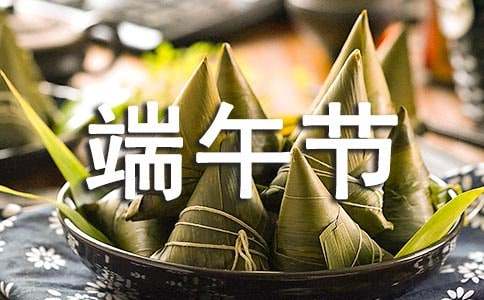端午節(jié)英語日記
端午節(jié)(The Dragon Boat Festival)

06月02 星期一 天氣:晴
The Dragon Boat Festival, also called Double Fifth Festival, is celebrated on the fifth day of the fifth moon of the lunar calendar. It is one of the most important Chinese festivals, the other two being the Autumn Moon Festival and Chinese New Year.
The origin of this summer festival centers around a scholarly government official named Chu Yuan. He was a good and respected man, but because of the misdeeds of jealous rivals he eventually fell into disfav or in the emperor's court.
Unable to regain the respect of the emperor, in his sorrow Chu Yuan threw himself into the Mi Low river. Because of their admiration for Chu Yuan, the local people living adjacent to the Mi Lo River rushed into their boats to search for him while throwing rice into the waters to appease the river dragons.
Although they were unable to find Chu Yuan, their efforts are still commemorated today during the Dragon Boat Festival.
家鄉(xiāng)的端午節(jié)(Hometown of Dragon Boat Festival)
At the end of the Zhou Dynasty, the area we now know as China had fallen into a state of fragmentation and conflict. While the Zhou dynasty had ruled for several centuries, several other states, originally feudal domains, tried to carve out their own kingdoms. The state of Qin would eventually emerge the victor and unify all of China under one rule for the first time in history.
Qu Yuan served as minister to the Zhou Emperor. A wise and articulate man, he was loved by the common people. He did much to fight against the rampant corruption that plagued the court-- thereby earning the envy and fear of other officials. Therefore, when he urged the emperor to avoid conflict with the Qin Kingdom, the officials pressured the Emperor to have him removed from service. In exile, he traveled, taught and wrote for several years. Hearing that the Zhou had been defeated by the Qin, he fell into despair and threw himself into the Milou River. His last poem reads:
Many a heavy sigh I have in my despair,Grieving that I was born in such an unlucky time.I yoked a team of jade dragons to a phoenix chariot,And waited for the wind to come,to sour up on my journey
As he was so loved by the people, fishermen rushed out in long boats, beating drums to scare the fish away, and throwing zong zi into the water to feed braver fish so that they would not eat Qu Yuan's body.
The Modern Dragon Boat Festival started from that time to this day, people commemorated Qu Yuan through Dragon Boat Races, eating zong zi, and several other activities, on the anniversary of his death: the fifth day of the fifth lunar month.
Dragon Boat races are the most exciting part of the festival, drawing crowds of spectators. Dragon Boats are generally brightly painted and decorated canoes. Ranging anywhere from 40 to 100 feet in length, their heads are shaped like open-mouthed dragons, while the sterns end with a scaly tail. . Depending on the length, up to 80 rowers can power the boat. A drummer and flag-catcher stand at the front of the boat. Before a dragon boat enters competition, it must be "brought to life" by painting the eyes in a sacred ceremony. Races can have any number of boats competing, with the winner being the first team to grab a flag at the end of the course. Annual races take place all over China, Hong Kong, Macao, Taiwan, and other overseas Chinese communities.
端午節(jié)(The Dragon Boat Festival)
The Dragon Boat Festival is a traditional Chinese festival held on the fifth day of the fifth month of the Chinese calendar. It is also known as the Double Fifth.[citation(引用;引證) needed] It has since been celebrated, in various ways, in other parts of East Asia as well. In the West, it's commonly known as Dragon Boat Festival.
The exact origins of Duan Wu are unclear, but one traditional view holds that the festival memorializes the Chinese poet Qu Yuan (c. 340 BC-278 BC) of the Warring States Period. He committed suicide by drowning himself in a river because he was disgusted by the corruption of the Chu government. The local people, knowing him to be a good man, decided to throw food into the river to feed the fish so they would not eat Qu's body. They also sat on long, narrow paddle boats called dragon boats, and tried to scare the fish away by the thundering sound of drums aboard the boat and the fierce looking carved dragon head on the boat's prow(船頭).
In the early years of the Chinese Republic, Duan Wu was also celebrated as "Poets' Day," due to Qu Yuan's status as China's first poet of personal renown(名聲名望).
Today, people eat bamboo-wrapped steamed glutinous(粘的) rice dumplings called zongzi (the food originally intended to feed the fish) and race dragon boats in memory of Qu's dramatic death.
【端午節(jié)英語日記】相關文章:
端午節(jié)英語日記帶翻譯03-05
我家鄉(xiāng)的端午節(jié)英語日記(精選27篇)11-07
端午節(jié)英語小報10-08
端午節(jié)的英語小報07-28
端午節(jié)的詩句英語08-08
(精選)端午節(jié)日記07-06
(精選)端午節(jié)日記07-08
[精選]端午節(jié)日記07-08
端午節(jié)日記(精選)07-09
端午節(jié)日記[精選]07-06